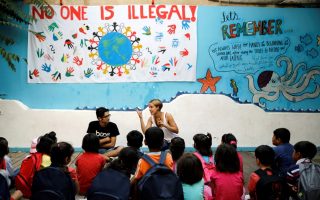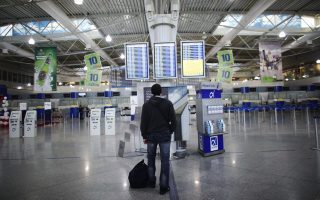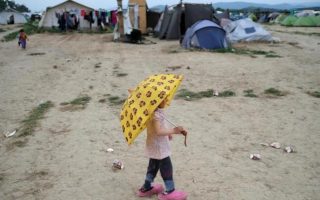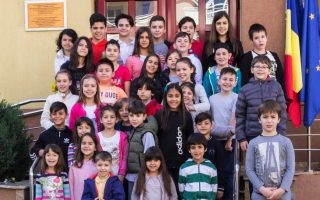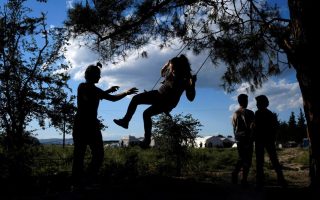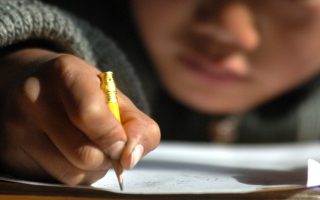On Greek islands, children of war hungry for school
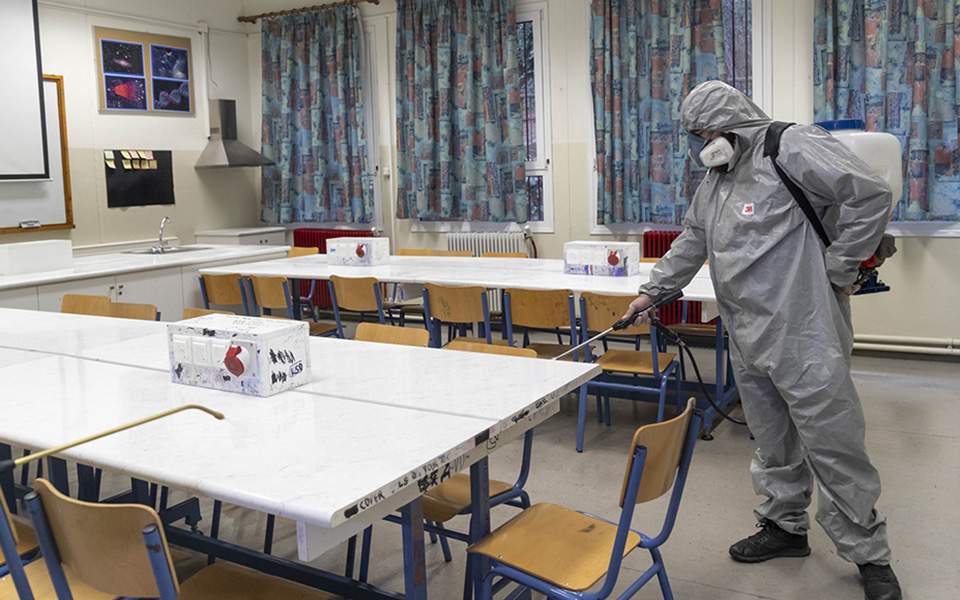
Standing with a group of children outside a refugee camp on the Greek island of Chios, little Roza can’t wait to get an early start to her day.
“Good school, good school!” she beams, her backpack on and pigtails bobbing.
Roza, a Syrian Kurd, is one of a small group of children in Greece’s island camps fortunate enough to get some schooling.
Thousands of others count education as just another loss in the long list of deprivations on the harrowing road from home.
Roza is one of some 270 children who are learning English, mathematics, arts and creative skills with “Be Aware and Share” (BAAS), a Swiss NGO which has been active on Chios since May.
Operating out of a converted former restaurant in the island’s port capital, the 20-strong team runs classes for children from the age of 6, as well as workshops for teenagers about cooking or going to the supermarket.
The school also promotes acceptance of other national backgrounds. And hygiene, including toothbrush use.
“We’re not here to replace mainstream school,” says Nicholas Millet, a British volunteer and one of the founders of the BAAS school.
“We provide an academic curriculum [but] for us, this is about children feeling like children again.”
BAAS project manager Jacob Rohde says the program provides “a drop of normality” for children, who also experience regular outbreaks of violence in the camp.
But he believes that getting children into mainstream Greek schools is an “absolute necessity.”
“Going to a normal school would provide these children with so much more of a sense of structure, safety and normality,” the 28-year-old German told AFP outside the school.
Inside, a teacher can be heard strumming a guitar for youngsters in class.
At the makeshift Souda camp, 28-year-old Djeneba from Mali is one parent who has agreed to send her child to the Swiss volunteer program.
“I want what is best for my child. She is the reason I’m here,” says this divorced mother, who fled Mali after her firstborn daughter died from the effects of genital mutilation.
There are more than 60,000 refugees and migrants in Greece. Among them are thousands of children, including around 2,000 who are entirely on their own – many under the age of 8.
More than half of these unaccompanied minors – 1,200 in all – are staying on the islands of the eastern Aegean.
According to the UN children’s agency UNICEF, refugee children in Greece have on average missed 20 months of school.
On the mainland, the Greek Education Ministry last week began after-hours classes for some 1,500 refugee children in 20 schools around the country.
However, there are currently no classes on offer at schools on several islands housing migrant camps.
The Education Ministry says children in island camps, many of whose parents have applied for asylum and are waiting to be relocated to the mainland, are on hold as their transfer could be imminent.
But Matina Katsiveli, a former magistrate who helps run a refugee support group on the island of Leros, says such a procedure could take up to six months.
“These children cannot mill about all day doing nothing… this is a very big mistake,” she says.
“And keeping them indoors with nothing to do will be difficult, especially now that winter is coming,” adds Katsiveli, part of an Aegean refugee support network which had been nominated to receive the Nobel Peace Prize.
For some, the notion of allowing refugees to attend Greek schools, even at different hours from the local children, is difficult to accept.
Earlier this week, parents at a Chios school circulated a makeshift questionnaire about refugee children receiving after-hours classes there, the tone of which was clear from the preamble.
“[There is] a difference of culture, socially acceptable behavior, religious expression and habits, but it is chiefly a matter of hygiene,” it said.
Despite assurances by state officials that no child will be allowed to join the program without vaccination, objections have also been raised at a few other schools on the mainland.
Last week, police had to escort refugee children into a school in Oraiokastro near Thessaloniki because around 40 Greek parents were protesting outside.
The Education Ministry has said more than 10,000 refugee children will enter Greek schools on the mainland by the end of October.
Tens of thousands of refugees and migrants who braved a perilous sea crossing from Turkey were left stranded in Greece earlier this year after several countries shut their borders, closing off their route to Northern and Central Europe.
Among them are thousands of Syrians fleeing war who are waiting for asylum approval or relocation elsewhere in the European Union.
But that procedure has been held up by the reluctance of many EU states to accept Muslim refugees after a spate of jihadist attacks in Belgium, France and Germany. [AFP]
